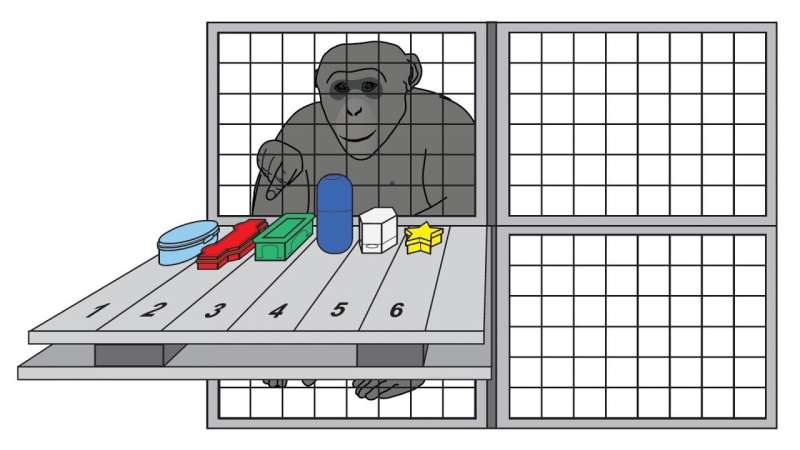Chimpanzees' working memory similar to ours

Previous studies have showed that chimpanzees have excellent long-term memory abilities. However, little is known so far about their working memory abilities. To explore this subject, the researchers presented chimpanzees with a task in which they could search for food in a number of small, opaque boxes. The chimpanzees first watched as pieces of food were hidden in the boxes. Then they searched for the food items by pointing at the boxes one by one. If a chosen box contained food, the chimpanzees received it as a reward. After each choice, the boxes were covered for 15 seconds.
To retrieve all of the food items, the chimpanzees needed to keep in mind which boxes they had already searched for food. The researchers increased the difficulty of the task depending on the ability of each chimpanzee by increasing the number of boxes and by shuffling the boxes between each search. The study revealed key similarities between chimpanzee and human working memory: The best-performing chimpanzees remembered at least four items; one young chimpanzee recalled more than seven items. They used both the appearance of the boxes as well as their position to remember their previous choices.
Humans typically perform worse in working memory tests if they need to do something in parallel. Likewise, if the chimpanzees had to perform a second, similar task in parallel, their performance declined. Differences in working memory ability between chimpanzees were stable over months. The most obvious difference between chimpanzees and humans was not the working memory capacity but the search strategies that humans typically employ to facilitate this task: Chimpanzees did not come up with the idea to search the boxes in line from one side to the other.
This study demonstrates that chimpanzees, like humans, possess working memory abilities that allow them to keep track of a series of previous events or actions. Contrary to previous claims, chimpanzees' working memory capacity does not appear to be fundamentally different from human capacity. "Our findings suggest that chimpanzees perform similar to seven-year-old children in an intuitive working memory task that does not rely on extensive training," says Christoph Voelter from the Max Planck Institute for Evolutionary Anthropology and the University of Veterinary Medicine Vienna.
More information: Chimpanzees flexibly update working memory contents and show susceptibility to distraction in the self-ordered search task, Proceedings of the Royal Society B: Biological Sciences (2019).
Journal information: Proceedings of the Royal Society B
Provided by Max Planck Society




















